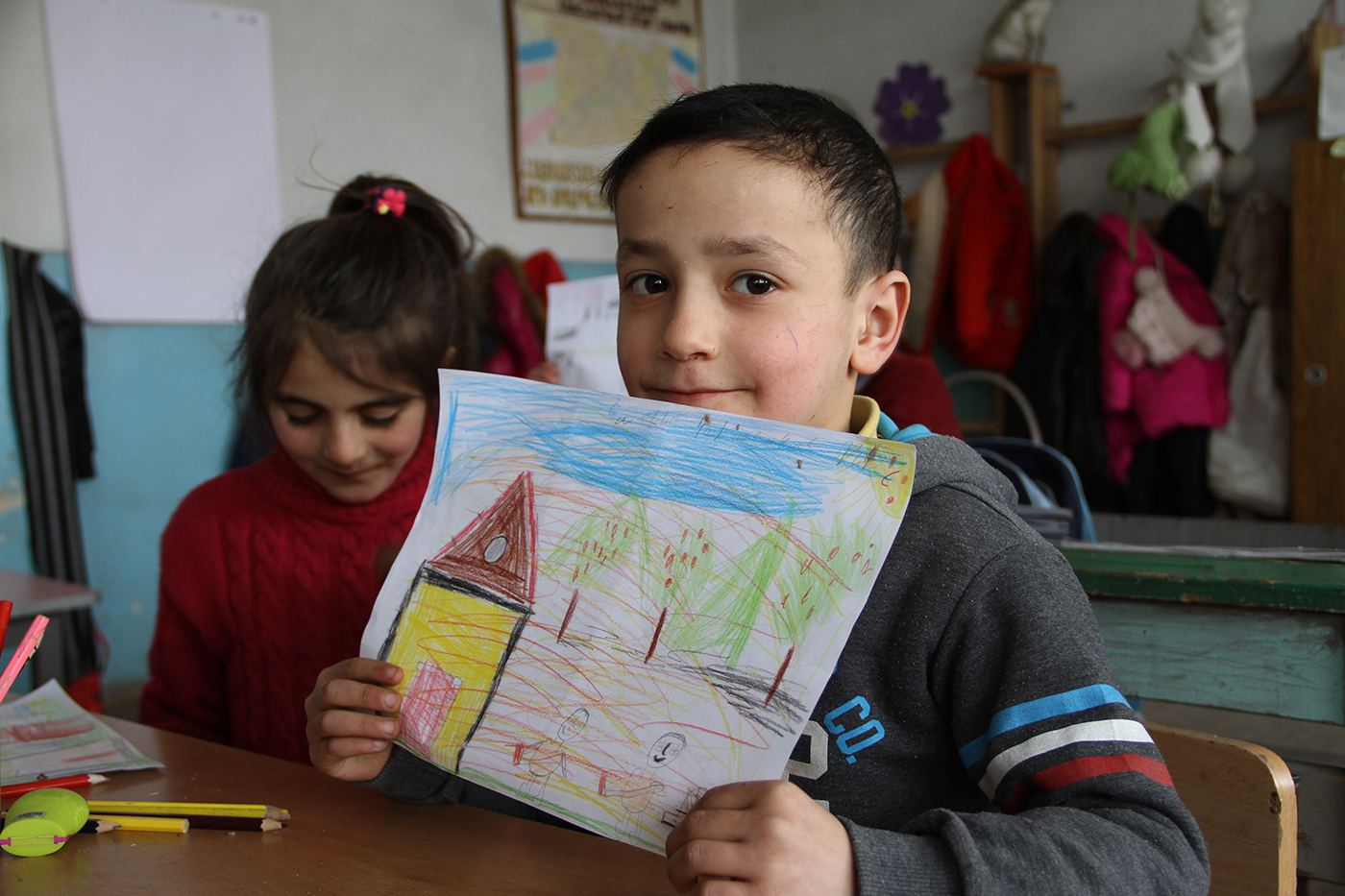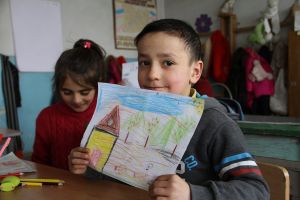
Family Environment and Services in Communities for Children of Armenia (FESCCA)
Project Description
World Vision (WV), together with the co-applicant partners Bridge of Hope and Children’s Support Centre Foundation (CSCF) hereby propose the action FESCCA for bringing system solutions to protection of child rights in Armenia. FESCCA is the result of a thorough analysis of the gaps and opportunities of the current Child Protection System (CPS) in Armenia and is designed considering the rich experience of partner organizations in this area. Inputs and participation of the Armenian Ministry of Labour and Social Issues (MLSI) as associate partner in designing this action ensured inclusion of the top priority geographic areas and issues at the same time guaranteeing the state ownership and sustainability of the results to be achieved.
The overall objective of the action FESCCA is to contribute to the establishment of community based quality care and social support for children in Armenia. The action is designed in line with EU guidelines on promotion and protection of the rights of the Child and supports the GoA to implement the UN Convention on the Rights of the Child for all children, including the most marginalized ones. Following the UN’s Guidelines for the alternative care of children FESCCA promotes the child care by their biological families and provision of sustainable and quality alternative care when children are deprived of parental care.
FESCCA also focuses on the rights of children with disabilities and suggests significant contribution to implementation of Articles 23 and 24 (respect for the home and the family and for education) of the UN Convention on the Rights of Persons with Disabilities. The overall objective and specific objectives of FESCCA echo the ones mentioned in the guidelines. FESCCA suggests a holistic approach and contributes to all 4 priorities of the call, since those are key interrelated directions of deinstitutionalization reforms taking place in Armenia, which FESCCA intends to support.
In addition, FESCCA is in line with the working principles set out in the guidelines. Particularly the project:
• Impact and results to be achieved are very tangible and measurable and concrete difference in children’s lives will be demonstrated through baseline and end line evaluations;
• Suggests a systems and rights-based approach tackling all key components: a) legislation, b) services; c) capacities; d) cooperation; and e) accountability from the angel of human rights; • Targets boys and girls subject of discrimination because of disability or being “social orphans”; • Lead applicant (WV) has a culturally sensitive and legally sound child protection policy defining behaviour protocols while interacting with children; principles and ethics which keep the best interests of children as the top priority and procedures to address child protection incidents. WV entities that enter into a formal agreement partners which provide services to children require signing and following the WV CP policy unless the later have stronger CP policy in place.
• Suggests application of evidence-based methodologies for deinstitutionalization and support to most vulnerable families. For the later lead applicant (WV) will use its “social work” expertise, as well as the “Graduation Model” with evidence of impact in a number of countries. Some of the advocacy actions are also a part of the methodological approach.
• Ensures the sustainability of results through having the written commitment of the authorized government body to allocate funds into the state budget from 2020 to ensure continuation and quality of alternative care services established in the scope of FESCCA.
The overall objective of the action FESCCA is to contribute to the establishment of community based quality care and social support for children in Armenia. The action is designed in line with EU guidelines on promotion and protection of the rights of the Child and supports the GoA to implement the UN Convention on the Rights of the Child for all children, including the most marginalized ones. Following the UN’s Guidelines for the alternative care of children FESCCA promotes the child care by their biological families and provision of sustainable and quality alternative care when children are deprived of parental care.
FESCCA also focuses on the rights of children with disabilities and suggests significant contribution to implementation of Articles 23 and 24 (respect for the home and the family and for education) of the UN Convention on the Rights of Persons with Disabilities. The overall objective and specific objectives of FESCCA echo the ones mentioned in the guidelines. FESCCA suggests a holistic approach and contributes to all 4 priorities of the call, since those are key interrelated directions of deinstitutionalization reforms taking place in Armenia, which FESCCA intends to support.
In addition, FESCCA is in line with the working principles set out in the guidelines. Particularly the project:
• Impact and results to be achieved are very tangible and measurable and concrete difference in children’s lives will be demonstrated through baseline and end line evaluations;
• Suggests a systems and rights-based approach tackling all key components: a) legislation, b) services; c) capacities; d) cooperation; and e) accountability from the angel of human rights; • Targets boys and girls subject of discrimination because of disability or being “social orphans”; • Lead applicant (WV) has a culturally sensitive and legally sound child protection policy defining behaviour protocols while interacting with children; principles and ethics which keep the best interests of children as the top priority and procedures to address child protection incidents. WV entities that enter into a formal agreement partners which provide services to children require signing and following the WV CP policy unless the later have stronger CP policy in place.
• Suggests application of evidence-based methodologies for deinstitutionalization and support to most vulnerable families. For the later lead applicant (WV) will use its “social work” expertise, as well as the “Graduation Model” with evidence of impact in a number of countries. Some of the advocacy actions are also a part of the methodological approach.
• Ensures the sustainability of results through having the written commitment of the authorized government body to allocate funds into the state budget from 2020 to ensure continuation and quality of alternative care services established in the scope of FESCCA.
Specific Objective
SO1: The government of Armenia is able to provide quality and sustainable alternative care within 5 targeted marzes (Armavir, Kotayk, Lori, Shirak and Syunik marzes).
Op. 1.1: Improved legislative and regulatory framework for quality care service provision and monitoring.
Op 1.2: Enhanced capacity of Child Protection system at regional and local levels for “gatekeeping, quality care provision and monitoring.
SO2: Children are cared for in family environment and receive community based services.
Op 2.1: Transition from institution to community and family based services promoted in targeted marzes.
Op 2.2: Quality inclusive education services promoted in targeted marzes.
Op 2.3. Resilience of socially most vulnerable families is increased to prevent possible abandonment of children.
Op. 1.1: Improved legislative and regulatory framework for quality care service provision and monitoring.
Op 1.2: Enhanced capacity of Child Protection system at regional and local levels for “gatekeeping, quality care provision and monitoring.
SO2: Children are cared for in family environment and receive community based services.
Op 2.1: Transition from institution to community and family based services promoted in targeted marzes.
Op 2.2: Quality inclusive education services promoted in targeted marzes.
Op 2.3. Resilience of socially most vulnerable families is increased to prevent possible abandonment of children.
Expected Results
Boys and girls placed in institutions of 6 targeted marzes of Armenia are deinstitutionalized and child best interest is ensured
Functional “gatekeeping” mechanism is in place to prevent children from institutionalization
Effective alternative care mechanisms are established in different regions of Armenia to provide alternative care services to children and ensure a family environment care for every child
Contribute to the development of legal regulations in the child protection system
Functional “gatekeeping” mechanism is in place to prevent children from institutionalization
Effective alternative care mechanisms are established in different regions of Armenia to provide alternative care services to children and ensure a family environment care for every child
Contribute to the development of legal regulations in the child protection system
Project map
Photo gallery
Videos
PSA_Family for children
PROJECT DETAILS
Armenia
Priority Area:
Partnership that protects Subsector:
Rule of law & human rights Topic:
Human rights Project Status:
Completed Start Date:
01.02.2019 End Date:
30.09.2022 Website:
www.wvi.org
EU Project Number:
402-828 